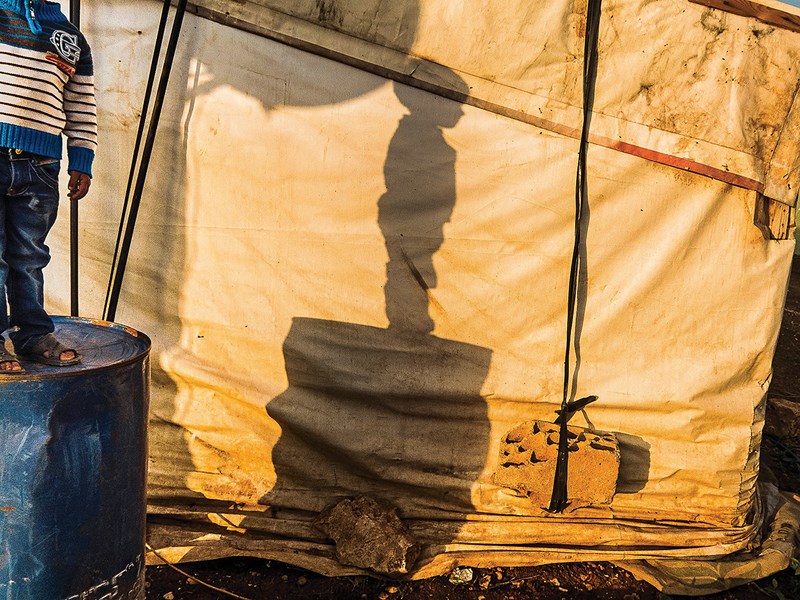Home/Shelter/Belonging at the Harmony Arts Festival. Featuring photographs by Hani Al Moulia and the Better Shelter Emergency Shelter developed by the United Nations Refugee Agency and the Ikea Foundation. Aug. 4 – 13. Curated by Robin Laurence and Darrin Morrison. Also on view in group show at West Vancouver Museum until Sept. 9>
Hani Al Moulia had big plans.
But five years ago when he was 17, Al Moulia and his family were forced to flee from their home in Homs, Syria, after the government launched a military assault on the city.
His plans to attend university had to be put on hold.
It was still the early days of the Syrian civil war, but the danger to Al Moulia and his family – as well as the hundreds of thousands of people that called Homs home – was very real.
Al Moulia fled the violence and destruction in Syria and found his way to a refugee camp in Lebanon.
His parents, four brothers and sister soon joined him.
“It was very difficult,” Al Moulia says. “We had our own house that my father built and we had, I would say, a good lifestyle. Going to a refugee camp was totally different because we couldn’t imagine ourselves being there, but it was the reality. It was difficult at the beginning, especially for me because I was going to university, that was my dream, and it was interrupted.”
At first he assumed they would be at the camp for a short while. But as the Syrian civil war raged on, Al Moulia settled into his new reality.
Instead of putting all his energy into constantly looking forward, he decided to step backwards, behind the camera lens, to find solace.
During an UN-led workshop at the camp, Al Moulia learned the photography skills that would help him take the poignant shots exposing the challenges – and, often, the everyday beauty – of refugee life.
In the process, Al Moulia, who is now 23 years old, has achieved international acclaim for his photography.
“I wanted to create something to do,” he says of life at the refugee camp. “Photography was there for me.”
Al Moulia and his family lived in that Lebanese refugee camp for three years. During that time, more than 200 inhabitants lived in tents, but for the most part adapted to their new situation the same way anybody would: by continuing to live, as one must.
Al Moulia says he was inspired by the people around him and tried to capture their energy through his photography.
Smiling children, people gathering, moments of frustration, a friendly haircut – these were the things that Al Moulia documented.
“I tried to document people’s behaviour,” he says. “When they go there, they don’t have any options. They have to adapt.”
In 2015, the family immigrated to Canada and settled in Regina, Sask.
Since then, Al Moulia has enrolled at Ryerson University and is pursuing a degree in computer engineering.
His stature as a photographer continues to grow.
A lot of attention is given to the fact that he has a visual impairment – a genetic eye condition that renders him legally blind. But for Al Moulia, his visual “impairment” is part of his artistry, not a hindrance.
Although he can’t technically see through a camera viewfinder, his mastery of how a camera works allows him to focus on all the other elements of photography besides the visual component.
“I have very limited vision, but when I think about photography I don’t really think about my vision,” he says. “I do it with my own style.”
A new exhibition at the West Vancouver Museum called Home/Shelter/Belonging featuring several of Al Moulia’s photographs is running until Sept. 9.
The exhibition also features the work of seven multi-disciplinary artists from different backgrounds working in a variety of mediums.
The exhibition pieces explore metaphors for home and shelter, ultimately showcasing larger themes of immigration and settlement in the wake of Canada 150.
A special showing of Al Moulia’s work will be on display at the Harmony Arts Festival from Aug. 4 – 13.
“They’re quite remarkable images,” says West Vancouver Museum curator Darrin Morrison. “They show human vitality in the face of adversity, and I think that’s what’s really interesting about his work.”
Al Moulia notes that his photo of a woman sitting by a fire is one of his personal favourites. The image features what looks like an older woman, hooded, sitting by a fire in the Lebanese refugee camp.
“I really do have a lot of emotion when I remember it because the lady said she was burning inside when I was talking about home when I asked her about it,” Al Moulia says.
He was drawn to the connection between the woman “burning inside” and the fire she was huddled next to.
As it turns out, the woman was heating up water by the fire so her son could take a shower, Al Moulia explains.



